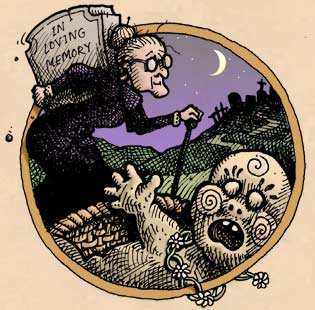
The Earth Baby
THERE ONCE WAS AN UNUSUAL WOMAN who knew three things more than other people know. For example, one day she made a little girl using clay from the river. She smoothed and kneaded her into the right shape, cut a pretty little hole for her mouth, and tied a dainty chain of snow flowers around her neck. Then she warmed the clay baby in the oven until the little mite opened her new mouth and cried a cry that sounded like a tiny earthquake. Yes: she made a baby out of mud and made her come to life. Most people don’t know how to do that.
All babies start their lives hungry and just get hungrier, and the earth girl was no exception. So the woman went out into her garden and found a few small, smooth pebbles, and popped them into the baby’s mouth. The little girl crunched them up and swallowed them down, and gurgled a little burp of satisfaction, like good babies do. So the pattern was set for the following years: the baby ate, while her mother spent her days and nights bringing back ever bigger stones. It was hard work because her daughter’s appetite grew and grew, and soon she was eating rocks as round as sheep and as fat as cows. But the second of three things that this woman knew was how to carry heavy stones, which she would toss lightly up onto her back before trotting home to feed her hungry daughter.
The two of them were happy, but everyone else was not. Their neighbours were uncomfortable with the baby who ate rocks, and her old mother skipping around with slabs the size of tombstones on her back. So they had them both put into prison, partly because some of the stones really had been stolen from the churchyard, but mainly because they were strange.
When the gaoler showed them to their cell and slammed shut the metal door (like this: clang!), the baby took a deep breath and started to cry. The old woman clucked her tongue and wagged her finger in the baby’s face, and told her stories to calm her down.
But there are only so many stories you can tell before you get bored of being locked in a cell.
So the old woman sucked her teeth and drummed her fingers for as long as it takes to get bored three times over. Then she pulled up one of the flagstones from the floor of their cell and gave it to her daughter to gobble up. When the gaoler next peeked though the grill on the door, he found two prisoners less and one hole more than he was expecting. He went in and peered into it; but he could see only darkness, because the hole already went down deeper than the light from his lantern dared to follow. But he fancied he could hear echoes of a sound a lot like crunching, and the odd laughter of an old woman who was taking with her one more thing that the rest of us never knew, and—unless you meet her down there—probably never will.
